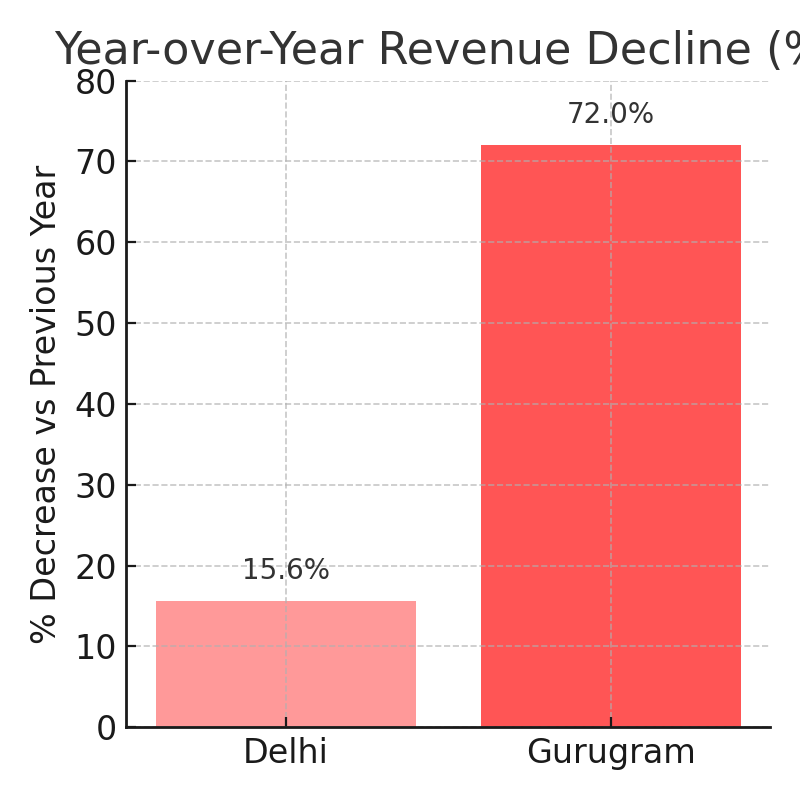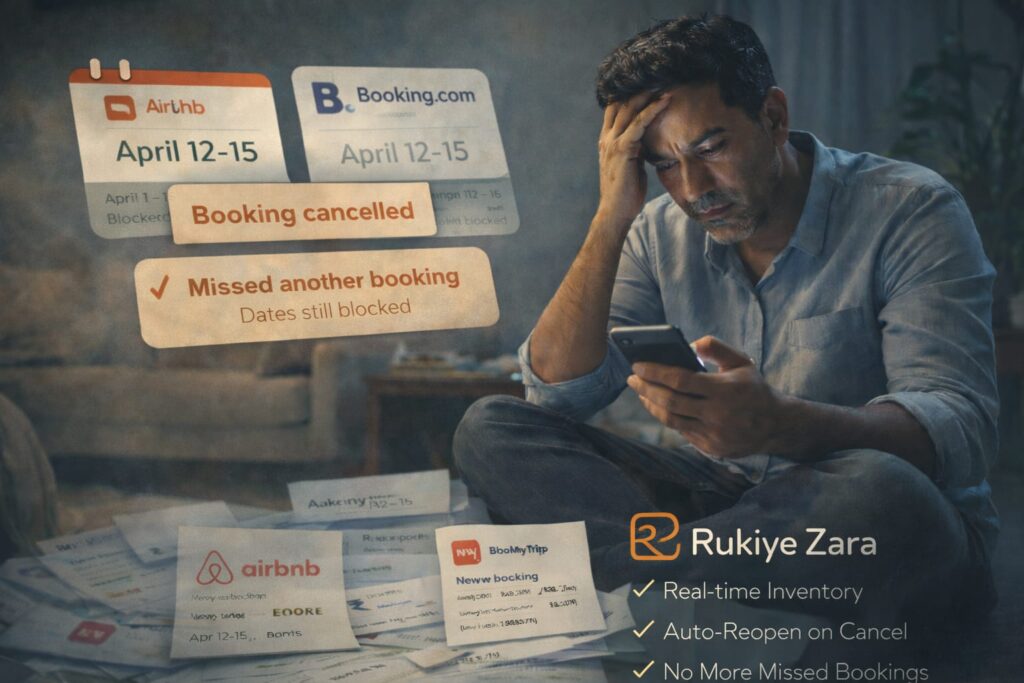Introduction:
If you’re a short-term rental host in Delhi or Gurgaon, you may have noticed a disturbing trend in 2025 – bookings have plummeted and profits are shrinking. This isn’t just your property; data shows it’s a widespread issue across the NCR region. In this post, we’ll dig into why bookings are down, using hard data and real host anecdotes to uncover the root causes.
The Alarming Numbers: Occupancy and Revenue Plummet
Let’s start with the facts. According to fresh market analytics from AirROI (a data provider for short-term rentals), both Delhi and Gurgaon have seen low occupancy rates and declining revenue compared to last year:
- Delhi: Average occupancy is only about 28.6%. The typical listing is booked barely a quarter of the time! Moreover, revenue has dropped ~15.6% year-over-year despite 2024-2025 being the first full year of normalized travel after the pandemic. Delhi has around 285 active listings on Airbnb, as of April 2025.
- Gurgaon (Gurugram): Occupancy is even lower, around 26.1%. And here’s the real shocker – median revenue per listing is down a staggering 72% vs last year. There are nearly 947 active listings in Gurugram on Airbnb, which is over 3 times the number in Delhi.
Year-over-year decline in median listing revenue, based on AirROI data for May 2024–April 2025 vs the previous year airroi.comairroi.com. Gurugram hosts saw a dramatic -72% drop in revenue, while Delhi hosts saw about -15.6%.

The chart illustrates the revenue freefall. Gurgaon’s 72% drop is extreme – effectively, if you earned ₹100 last year, you’re earning only ₹28 for the same period this year. Delhi’s ~16% drop, while less catastrophic, is still a significant hit to host incomes. Combined with low occupancy percentages, it’s clear that a lot of nights are going unbooked. In Gurgaon’s case, a 26% occupancy means roughly 3 out of 4 nights have no bookings. airroi.com
Oversupply: Too Many Listings, Not Enough Guests
So what’s causing this downturn? The oversupply of rentals is a major culprit. Put simply, the number of Airbnb listings in Delhi NCR has exploded, while the pool of guests hasn’t grown at the same pace. It’s a classic case of too many hosts chasing the same limited demand.
Consider Gurugram: AirROI data shows 947 active Airbnb listings in the past year. That’s an enormous supply for one market. Many of these are new hosts or investors who jumped on the short-term rental bandwagon. In fact, on Reddit one host wryly noted, “Welcome to India where every other person wants to open an Airbnb.”reddit.com It might sound like a joke, but it rings true – a flood of new listings has entered the market recently. A Reddit user in Gurgaon observed that lots of people are leasing properties just to put them on Airbnb (rental arbitrage), seeing it as easy money.
Airbnb’s own strategy has fueled this growth in host supply. The company has actively encouraged more people to become hosts – running ad campaigns, simplifying the sign-up process, and even promoting that “guests can become hosts” as part of their marketing rentalscaleup.com. This aggressive recruitment means the host community has grown rapidly, especially in popular areas like Gurgaon where real estate investors see high rental yields.
The result? Oversaturation. When you have hundreds of listings in a city, many will inevitably sit empty if traveler demand doesn’t keep up. As one industry analysis described, “rapid proliferation of listings on the platform [is] causing a decrease in bookings per listing for existing hosts” rentalscaleup.com. Essentially, more hosts are splitting the same pie – and each host gets a smaller slice than before. In Airbnb community forums, you even see complaints like “For every 100 Airbnb properties, 88 of them did not have a guest… [Airbnb] have an oversupply of hosts and it is killing them.” community.withairbnb.com While that comment was about a different region, the sentiment applies in NCR as well: there are way more listings than what current demand can fill.
Static Demand: Travel Growth Isn’t Keeping Up
The other side of the coin is demand – or lack thereof. While supply skyrocketed, guest demand has remained relatively flat in the Delhi area. Domestic travel in India is strong in general, but it hasn’t grown enough in Delhi/Gurgaon to absorb the hundreds of new Airbnbs. Unlike true tourist hotspots (Goa, hills stations, etc.), Delhi NCR sees a lot of business travel and occasional tourism, which have finite growth.
AirROI’s occupancy figures suggest demand hasn’t expanded: occupancy ~26–29% is low. For context, a healthy occupancy in the hospitality industry is often 60-80% for a desirable market. NCR’s ~28% means hosts are competing to attract the same guests, and many nights go empty. The AirROI report explicitly notes “Lower demand” as a factor in these low occupancy rates airroi.com. Essentially, guest booking activity is not increasing enough to match the surge in listings.
Why is demand static? A few reasons:
- Seasonality: Delhi’s travel season peaks in cooler months. AirROI data indicates May is the peak revenue month in both Delhi and Gurgaon, while the lowest is winter (Dec in Delhi, Aug in Gurgaon)airroi.comairroi.com. Beyond seasonality, there hasn’t been a major uptick in year-round tourism to Delhi to offset the increased supply.
- No Post-Covid Boom: Unlike some leisure destinations, Delhi didn’t see a huge post-pandemic travel boom. Business travel resumed, yes, but that’s fairly steady, and international tourist arrivals to India have been recovering slowly. So demand in 2024/25 is probably just back to normal levels – not 3x higher to match the 3x rise in listings.
- Traveler Options: Guests have more choices (thanks to the oversupply). Many can afford to be picky or wait for discounts. Some travelers may also be returning to hotels now that prices have normalized, meaning Airbnb isn’t gaining all possible demand.
The net effect is a demand-supply mismatch. Picture a marketplace where the number of “rooms” doubled or tripled, but the number of travelers stayed the same – every host’s occupancy and pricing power drops. Static demand + exploding supply = far fewer bookings per host.
The Impact on Hosts: Price Wars and Lower Profits
For individual hosts, these market dynamics have tangible effects:
- Fewer Bookings: As we saw, the average host is getting significantly fewer nights booked than before. Hosts who used to enjoy consistent reservations now face empty calendars for weeks on end.
- Lower Rates: With intense competition, many hosts slash prices to attract the limited pool of guests. A Reddit thread in r/airbnb_hosts discussed how in oversaturated markets, hosts keep undercutting each other on price to appear competitive reddit.com. This “race to the bottom” means even when you do get bookings, you might be charging less per night than you did last year, squeezing your margins.
- Reduced Revenue: Fewer nights and lower nightly rates obviously hit revenue hard. We already quantified that drop – e.g. a median 72% revenue reduction in Gurgaon airroi.com. Even with cost-cutting, that kind of revenue hit can turn a once-profitable listing into a break-even or loss-making venture after expenses.
- Host Frustration: Many hosts are understandably anxious or upset. You might wonder if you did something wrong or if Airbnb’s algorithm has punished your listing. As one host put it, “I feel like Airbnb changed something… our bookings dropped off a cliff!” (common sentiment on host forums). In reality, it’s largely a market glut issue, not just an algorithm issue.
Oversupply hurts everyone’s occupancy and profits – except maybe the guests, who have endless choices and often lower prices. One Gurgaon host quipped that it’s “amusing” how many new hosts have entered thinking it’s easy money, when in truth they’re just contributing to each other’s woes. On Reddit, another experienced host advised: in a vacation destination, you want guests to return off-platform if possible, because on Airbnb “in markets where there are 1000+ listings, this [saturation] can occur.”reddit.com In short, competing against thousands of similar listings on Airbnb is a losing battle right now in Delhi NCR.
A Glimpse of Hope: Adapting Strategies and Community Solutions
It’s not all doom and gloom. Knowing the problem – oversupply and static demand – means you can start to adapt:
- Differentiate Your Listing: In an oversaturated market, standing out is crucial. Ensure your listing offers unique value (exceptional decor, amenities, service) that others don’t. This can improve your conversion even if overall demand is limited.
- Optimize Pricing Smartly: Rather than blindly undercutting, use dynamic pricing tools or strategies to at least maximize revenue on high-demand days and not race to the bottom on low-demand days. Some top properties still maintain ~50-60% occupancy by being savvy (e.g., best-in-class listings in Gurugram achieve ~67% occupancy airroi.com by optimizing availability and rates).
- Diversify Channels: Relying solely on Airbnb might be risky. Some hosts list on multiple platforms (Booking.com, direct booking websites, etc.) to tap every possible guest. In a saturated market, casting a wider net for guests can help.
- Collaborate with Other Hosts: This is a big one – instead of viewing every host as pure competition, banding together can actually create new opportunities. Community-driven platforms are emerging where hosts work together rather than compete (more on this below).
Speaking of collaboration, one promising approach for Delhi/NCR hosts is joining a host community like Rukiye Zara. Rukiye Zara is a new community-driven hosting platform built by hosts, for hosts. It’s designed specifically to address the very issues we discussed:
- Supply Control: Rukiye Zara strategically manages its host network to avoid internal oversupply. That means as a host you’re not drowned out by thousands of identical listings; the platform maintains a balance so all members get a fair shot at bookings.
- Shared Demand & Marketing: Rather than each host individually trying to drum up business, Rukiye Zara does collective marketing (including sponsored social media ads) to bring guests directly to its community. This pooled effort can drive more demand to your property than you might get on your own. Essentially, it’s our listings versus the market, not your listing versus 900 others.
- Free Property Management System (PMS): Every Rukiye Zara host gets a free PMS tool to manage bookings, calendars, and guest info across platforms. This helps you efficiently handle those multiple channels and avoid double-bookings or lost inquiries.
- Guest Re-Marketing: Importantly, Rukiye Zara emphasizes guest retention. When you get a booking, that guest becomes part of your guest database (not hidden by Airbnb). RZ provides tools to remarket to past guests – so you can encourage repeats (we’ll cover the power of repeat guests in our next post).
- Direct Booking Engine: Rukiye Zara powers direct bookings, meaning repeat or referral guests can book your place without hefty OTA fees. This not only saves money but also builds a loyal customer base for you.
In short, Rukiye Zara flips the script. Instead of going it alone in an oversaturated marketplace, you join a curated network that cooperatively boosts everyone’s bookings and controls the supply-side chaos. Many hosts are starting to realize that community is strength – by banding together, hosts can achieve better occupancy and earnings than if they all try to compete individually.
Conclusion & CTA:
The drop in bookings across Delhi and Gurgaon is real, and it’s rooted in market fundamentals: too many listings, not enough guests. While you can’t single-handedly increase tourist demand, you can change how you respond. Consider collaborating with fellow hosts or platforms like Rukiye Zara that are specifically tackling oversupply and helping hosts thrive through collective strategies. By joining a community of hosts and leveraging data-driven tactics, you can regain control of your bookings and profits. Don’t let oversupply kill your hosting business – instead, turn it around by being part of the solution. Join Rukiye Zara today to be a part of an empowered host community that has your back, and say goodbye to those empty calendars!
Ready to break out of the Airbnb oversupply trap? Learn more about Rukiye Zara and how this host community is changing the game for Delhi-NCR rentals. It’s time to stop losing bookings and start winning together. 🚀 (Stay tuned for our next post on retaining guests – another key to thriving in this market!)











